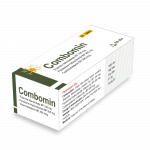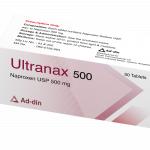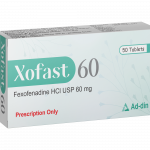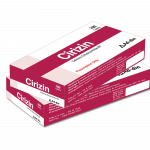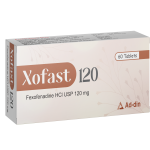Composition
Each tablet contains Rupatadine Fumarate BP equivalent to Rupatadine 10 mg.
Pharmacology
Aladin (Rupatadine) is a second-generation, non-sedating, long-acting histamine antagonist with selective peripheral H1 receptor antagonist activity. It also antagonizes the platelet activating factor (PAF) according to in vitro and in vivo studies. Both histamine and PAF cause bronchoconstriction which leads to an increase in vascular permeability and acts as a mediator in the inflammatory process. With the dual mode of action, Rupatadine shows a better therapeutic effect than an isolated antihistamine. Aladin (Rupatadine) possesses anti-allergic properties such as the inhibition of the degranulation of mast cells induced by immunological and non-immunological stimuli, and inhibition of the release of cytokines, particularly of the Tumor Necrosis Factor (TNF- α) in human mast cells and monocytes. Aladin (Rupatadine) shows high H1 receptor affinity and little or no activity on other CNS receptors. It also has a very long side chain and little liposolubility; therefore, there is little or no crossing of the blood-brain barrier. These properties account for the observed lack of sedation.
Indication
Aladin (Rupatadine) is indicated for the symptomatic treatment of seasonal and perennial allergic rhinitis such as sneezing, runny nose, itching in the eyes and nose, and urticaria (an allergic skin rash) such as itching and hives (localized skin redness and swelling) in adults and adolescents (over 12 years of age).
Dosage and Administration
Children: Neither the safety nor the efficacy of Aladin (Rupatadine) has been established in patients less than 12 years of age.
Adults and Adolescents (above 12 years): 10 mg (one tablet) once daily, with or without food.
Elderly: Aladin (Rupatadine) should be used with caution in the elderly. No information is available that indicates the requirement of any dose adjustment in this population.
Patients with renal or hepatic insufficiency: Use of Aladin (Rupatadine) is not recommended in patients with renal or hepatic insufficiency, as no relevant clinical data is available.
or, as directed by the physician.
Contraindication
The use of Rupatadine is contraindicated in patients with hypersensitivity to any of the components of this product.
Precautions
Rupatadine should be used with caution in patients with known prolongation of the QT interval, patients with uncorrected hypokalemia, and patients with ongoing proarrhythmic conditions, such as clinically significant bradycardia or acute myocardial ischemia. Rupatadine should be used with caution in elderly patients (65 years and older). As there is no clinical experience in patients with impaired kidney or liver function, the use of Rupatadine 10 mg tablets is at present not recommended in these patients.
Side Effects
The most common undesirable effects associated with Rupatadine use in controlled clinical studies were somnolence (9.5%), headache (6.9%), and fatigue (3.2%). Other common undesirable effects include dizziness, dry mouth, and asthenia.
Use in Pregnancy and Lactation
Pregnancy Category is B2 (according to TGA). Data on a limited number of exposed pregnancies indicate no adverse effects of Rupatadine on pregnancy or the health of the fetus/ newborn child. Animal studies do not indicate direct or indirect harmful effects concerning pregnancy, embryonal/ fetus development, parturition, or postnatal development. Clinical data for Rupatadine or other compounds of the class are inadequate to establish safety in pregnancy.
No information is available, on whether Rupatadine is excreted in the mother’s milk. Therefore, it should not be used during pregnancy and lactation, unless the potential benefits for the mother justify the potential risk to the infant.
Drug Interaction
CYP3A4 inhibitors like Erythromycin and Ketoconazole inhibit both the presystemic and systemic metabolism of Rupatadine. Due to this potential interaction, it is not recommended to use Rupatadine in combination with Ketoconazole, macrolides, or any other inhibitors of CYP3A4. Co-administration of Rupatadine and CNS depressants or alcohol may increase CNS depressant effect.
Storage
Store below 30⁰C, protect from light & moisture. Keep out of the reach of children.
Packaging
Each box contains 30 tablets in Alu-Alu blister pack.


